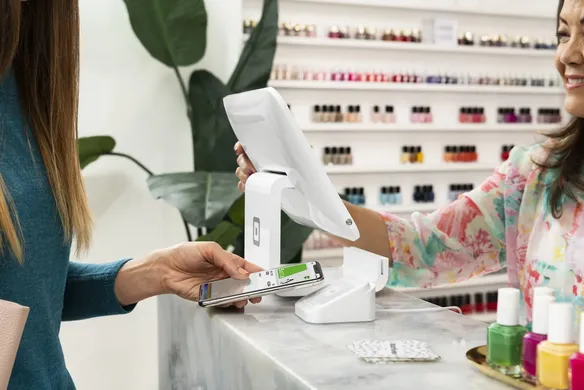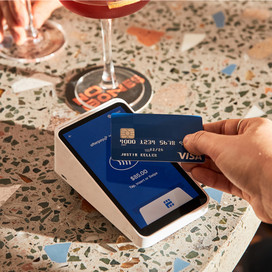Table of contents
You may have heard the term ‘fintech’ and wondered what it really means. Fintech is an abbreviation of ‘financial technology’. Of course, financial technology has been around for decades, but the term started becoming more mainstream during the Global Financial Crisis of 2007/2008 when a redesign of the financial sector was needed.
There are now businesses that specialise in fintech. From software companies working on financial services apps and programs to those building financial service hardware solutions for business. So, while you may have never used the word before, fintech touches everybody’s life, from individuals to major corporations. Let’s take a deeper look into fintech, and how it impacts our world today.
What is financial technology – Fintech?
The fintech meaning is broad and is used to describe all types of financial technology. This covers everything from products used to accept payments to cryptocurrency applications. While the term is relatively new, financial technology has been around for decades. The first ATM went live in the 1960s, being the first notable form of fintech.
Historically, banks, lenders and software companies have all sought to create fintech products to serve customers better. In more recent times, fintech has become a booming industry, but rather than being the domain of major financial institutions and lenders, the tech world has become increasingly more involved. Companies are now marketing a range of innovative financial solutions for both businesses and individuals, from making it easier to find finance and investors to changing the way everyday customers interact with their own finances.
How has fintech impacted small businesses
Fintech is now a major consideration for anybody looking to start a small business. In years gone by, from the cash era and even through to the first EFTPOS terminals, choices were limited in terms of how businesses chose to accept payments. Now, there is a range of options when it comes to payment processing, and a huge selection of fintech products to help small businesses grow.
1. Accept payments easier
Businesses now have more options than ever when it comes to accepting payments. You can accept cash, credit and debit cards, contactless payments such as Apple Pay, and even cryptocurrency. Payment options are also no longer limited to being in-store only.
With digital eCommerce on the rise, many businesses are adopting an online store. It’s easy to build one now, with products like Square Online, which is a form of fintech in itself. Square Online allows businesses to build an online store and accept payment through a wide variety of sources. This is great from a customer point of view because they have a choice of several different payment methods. It’s also great for businesses because these forms of digital transfers are easy, fast and allow transactions to occur smoothly with very little human intervention.
Even brick-and-mortar businesses can enjoy the payment flexibility that fintech provides, by allowing customers to place orders and pay online for an easy pick-up or delivery process.
2. Integrated financial management
Managing finances and record-keeping in a small business can be a nightmare. Many owners spend hours each week keeping track of bills, payments and invoices.. Fintech has produced some terrific integrated financial management systems to make this process so much easier.
For example, income from your Point of Sale system is automatically recorded in your accounting package. Bills and invoices can be scanned instead of being entered manually. Bills can be paid automatically, and you can even set up direct debit payments for your customers.
With all of these systems constantly speaking to each other, your financial management is basically automated. You can even access reports and insights into your cash flow and overall financial situation at the click of a button.
3. Making financial technology easy to adopt
Small businesses often have trouble implementing new technology because it’s hard to learn. Especially when dealing with something as complex as finance, you can understand why these systems have been complicated for business owners in the past.
Fintech, much like any other industry, places a strong emphasis on the end-user (you). So, new forms of financial technology are designed with easy adoption and use in mind. This also goes back to the integration point, because modern fintech often focuses on how a product or service can link up to third-party software. For example, the way Square Point of Sale syncs data easily with accounting software like Xero and MYOB.
4. Helping small businesses grow
Fintech provides an avenue for businesses to grow. roducts are designed to reduce the time it takes to manage financial tasks. Payments are faster, record-keeping is (mostly) automated, even syncing your inventory with an online store is easy. This gives business owners more time to grow their business, rather than being bogged down with admin.
In addition, many forms of fintech are centred not just around managing finance, but also obtaining it. Small businesses now have more access than ever to lenders and investors who can help them grow their ideas.
How does fintech work?
Because fintech is such a broad term, describing many different concepts, products and services, it’s near impossible to explain how every aspect of fintech works. In fact, technology is constantly evolving. If you think back to when ATMs were first developed and how they differ drastically from the multitude of products and systems in the marketplace today.
More modern forms of fintech embrace machine learning and artificial intelligence (AI), particularly when it comes to financial service apps that can be used to manage investments, or digital marketplaces that put borrowers in touch with lenders. A cryptocurrency is a form of fintech which is most notable for using blockchain technology.
As with any industry that operates in the digital space, cybersecurity is always at the forefront, which means that fintech companies need to keep up with technology that mitigates fraud and cyber-attacks.
Fintech examples
1. Payments
Businesses have more choices than ever regarding how they accept payment for goods and services. Square Payments is one such technology that makes it easy for businesses to get paid. With solutions for accepting payments in-person, over the phone, online or remotely, Square’s payment processing system has been adopted by businesses all over the world. Ultimately, it lets you provide more options for customers, spend less time chasing overdue payments, and customers love having several easy payment options.
Best of all, it syncs easily with Square’s Point of Sale system, meaning everything is integrated all in one place and record-keeping is a breeze.
2. Digital wallets
Just when the world thought tapping a credit card on an EFTPOS terminal was as easy as it gets for making payments, fintech delivered an even more convenient solution. Consider products such as Apple’s digital payment system, Apple Pay. This uses near field communication (NFC) technology to allow customers to make contactless payments by holding their phone over a payment terminal, such as Square Reader or your everyday EFTPOS terminal.
This piece of fintech has gone one step further, making contactless payment possible with synced smartwatches and even some fitness trackers, giving customers more convenience when paying for goods and services.
3. Cryptocurrency
Cryptocurrencies are digital coins or tokens that only exist in the digital world. The most famous, of course, is Bitcoin. Cryptocurrency uses blockchain technology to facilitate secure transfers. For many, the appeal of cryptocurrency is the lack of government regulation. It’s also one of the biggest concerns for non-adopters.
4. Small business loans
Fintech has been responsible for making it easier for businesses to secure finance. Some of these include online marketplaces that link borrowers with investors and even artificial intelligence-based products that help users find lenders based on their current circumstances and needs.
Square Loans, puts the power back in the business owner’s hands. Rather than operating on a set schedule of monthly payments, Square users simply repay the loan from a percentage of their daily sales. This means there are no physical payments to make – it happens automatically and on slow days, you pay less towards your loan.
5. Robo advisors
Robo advisors are becoming extremely popular in the investment world because they use artificial intelligence and machine learning to help manage investment portfolios. Products like Raiz, for example, allow users to start investing with as little as $5. The system invests in exchange-traded funds according to your trading preferences.
Impressively, you can either invest lump sums, allocate a certain amount per day, or even round up purchases on your bank card and invest the spare change.
6. Peer to peer lending
Getting a business loan in Australia can be challenging because banks often require property as security. Rather than dealing with traditional business loans, fintech has introduced services like SocietyOne, which brings together people who want to borrow money and those looking to invest in businesses.
How Square leads the fintech industry
Square was built on the premise that everybody should be able to participate and thrive in the modern economy. Technology has often been a barrier for small businesses, it has been too complicated or too expensive to invest in. Square looks to break down those barriers and offer products that everybody can use – at affordable prices.
What started as a smart piece of card-reading technology businesses could use to accept payments, has now grown into something much bigger. Square now offers everything from complete point of sale systems to small business loans. With Square, you can start your business and grow it effortlessly with easy-to-use technology solutions.
![]()











